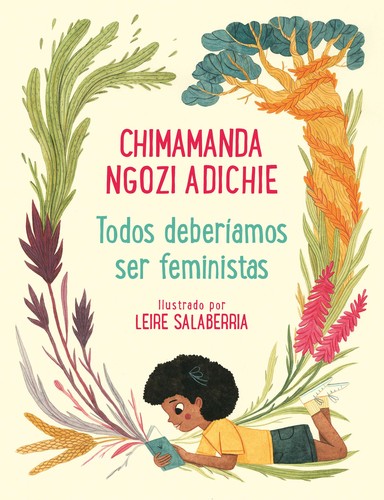Misha (on Bookwyrm) (e)k Chimamanda Ngozi Adichie(r)en We Should All Be Feminists liburuaren kritika egin du
Important points (but no new points)
3 izar
Important points, beautiful/sad points, (but not many new points/ ideas/ calls to action).

48 orrialde
Spanish hizkuntza
2020ko mar. 17a(e)an Penguin Random House Grupo Editorial(e)n argitaratua.
La edición ilustrada del clásico Todos deberíamos ser feministas de Chimamanda Ngozi Adichie.
«Empecemos a soñar con un plan para un mundo distinto. Un mundo más justo. Un mundo de hombres y mujeres más felices y más honestos consigo mismos. Esta es la forma de empezar: criemos a nuestras hijas de otra forma. Y también a nuestros hijos.››
Tras su célebre charla TED, Chimamanda se convirtió en la portavoz del feminismo a nivel mundial. Esta edición, ilustrada por Leire Salaberria, ayudará a difundir su maravilloso y revelador mensaje de igualdad entre las nuevas generaciones.
«Imagínense lo libres que seríamos siendo quienes somos en realidad, sin sufrir la carga de las expectativas de género.»
Important points, beautiful/sad points, (but not many new points/ ideas/ calls to action).
For a little while now I’ve been wanted to read more feministic literature but I hadn’t gotten round to it till today. I decided that We Should All Be Feminists should the start of my journey through feministic literature. Above all else this book started a desire within me to take up public speaking, to speak for those who have no other means of public communication, to speak to those who otherwise won’t or don’t listen, and most of all, to share, further, and develop ideals that should be globally accepted.
One point in the book that really stood out to me was the mention of the differences between referring to yourself as an egalitarian rather than as a feminist. To quote Adichie, ‘to choose to use the vague expression human rights is to deny the specific and particular problem of gender. It would be a way of pretending that …
For a little while now I’ve been wanted to read more feministic literature but I hadn’t gotten round to it till today. I decided that We Should All Be Feminists should the start of my journey through feministic literature. Above all else this book started a desire within me to take up public speaking, to speak for those who have no other means of public communication, to speak to those who otherwise won’t or don’t listen, and most of all, to share, further, and develop ideals that should be globally accepted.
One point in the book that really stood out to me was the mention of the differences between referring to yourself as an egalitarian rather than as a feminist. To quote Adichie, ‘to choose to use the vague expression human rights is to deny the specific and particular problem of gender. It would be a way of pretending that it was not women who have, for centuries, been excluded. It would be a way of denying that the problem of gender targets women.’